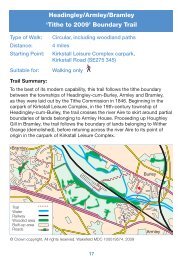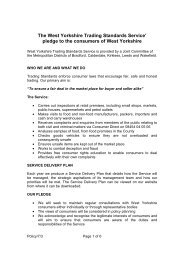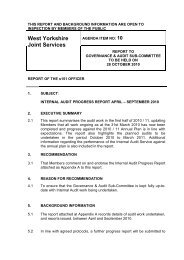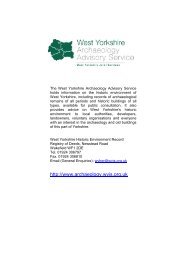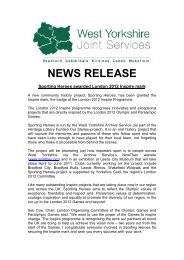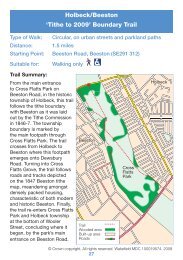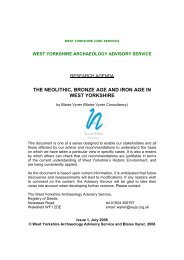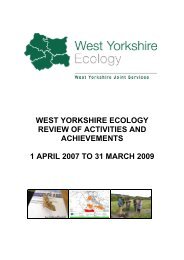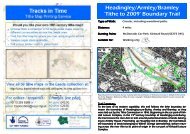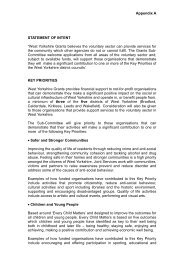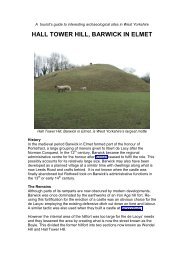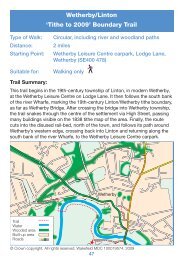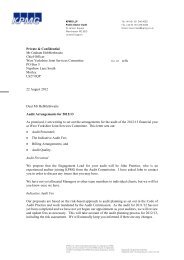Collections Guide - West Yorkshire Joint Services
Collections Guide - West Yorkshire Joint Services
Collections Guide - West Yorkshire Joint Services
Create successful ePaper yourself
Turn your PDF publications into a flip-book with our unique Google optimized e-Paper software.
the first purpose-built accommodation in Halifax for the post office. The premises were enlarged in 1926-1927 to provide accommodation for the first local automatic telephone exchange.(DC:194) 1916-1926 Correspondence, accounts, receipts, etc relating to ‘trading withthe enemy’ and enemy debtsForms part of the records of John Crossley and Sons Ltd, carpet manufacturers of Dean Clough Mills,Halifax.Anti-War/Conscientious Objectors(MISC:445) 1916 No Conscription Fellowship, Halifax Branch, photocopy ofcorrespondence from William R Stoker, Secretary of the Halifax Branch, concerningarrest of conscientious objectorsThe No Conscription Fellowship (NCF) was formed to support those who objected to taking up arms in theFirst World War. These men became known as "Conscientious Objectors". The grounds of objection variedwith some, such as Quakers, objecting on religious grounds, whilst others were opposed on politicalgrounds. The movement began in the autumn of 1914 when, at the suggestion of his wife Lilla, FennerBrockway - editor of the strongly anti-war ILP newspaper Labour Leader - invited those who were notprepared to render military service to get in contact. There was an immediate response that led to theestablishment of an organisation, the No Conscription Fellowship, in November 1914 with 300 initialmembers and most of the secretarial work being done by Lilla from their cottage in Derbyshire. The NCFestablished a network of branches across the country to fight against the threatened Military Service Bill.Members declared their intention not to render military service or perform war-work and pledged themselvesto fight for their beliefs and for peace. The NCF was organised meticulously, keeping records of every CO,the grounds of his objection, his appearance before tribunals, civil courts, courts martial, and even whichprison or Home Office settlement they were in. They also maintained contact with objectors, arranging visitsto camps, barracks and prisons across the country and holding pickets of prisons. The NCF had a pressdepartment, which constantly sought to draw the attention of the public to what was happening to COs andthe ill-treatment and brutality many suffered. They also published leaflets and pamphlets and from March1916 a weekly newspaper called The Tribunal. The NCF worked with two other organisations; the Friends'Service Committee and Fellowship of Reconciliation. Their activities were co-ordinated through the <strong>Joint</strong>Advisory Council (JAC). Ranged against them they had the full might of the government, the police, thearmy, most churches and the press which whipped up public opinion against "conchies" as they werelabelled. Immense personal pressures were put on them not just by the state, but also by communities,neighbours, friends, even families. They also had to withstand the pressure to conform when isolated inbarracks, army camps and prisons. Some forty were shipped to France in May 1916 as the government andarmy attempted to break the movement. Some were actually sentenced to death after court-martial,although the sentences were commuted to 10 years imprisonment as the NCF received increased publicityfor what was happening. Seventy three men died after being arrested, the first ten whilst still in prison. Aboutforty suffered mental breakdowns. Altogether, about 16,000 men refused to fight. According to NCF figures6312 men were arrested for resisting conscription and over 800 served more than two years in prison.Thousands of other COs refused to bear arms but accepted service in ambulance units, the Friends Relief



